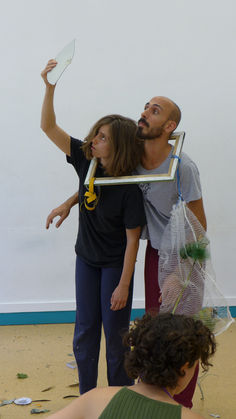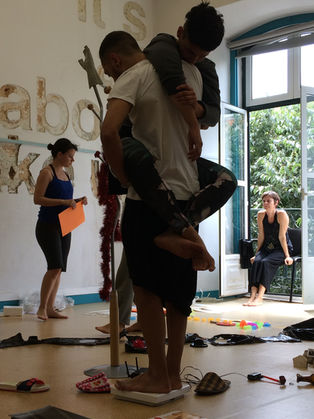

The Modus Operandi AND [MO_AND]
The Modus Operandi AND (MO_AND) consists of an ethics of Re-parar, Reparagem and Reparação [three modulations of Reparar - stopping-again, noticing and repairing/taking care of], systematized in a set of concept-tools and proposition-games that facilitate:
the direct and experiential inquiry of the functioning of the Event and the Relation;
the explicitness of modes of emergence and sustainability of metastable and common events/accidents;
awareness of the contingent-impermanent conditions of possibility of each encounter and of the political consequences of individual and/or collective positions;
the refinement of abilities such as the non-hierarchical distribution of attention and the (re)inventory-trajectory of the possible, simultaneously in the plane of self-observation and in the plane of mapping the surrounding situation;
training the capacity to be sensible and receptive to difference and the unpredictable/accidental, as well as training abilities of timely and fair compearance, situated decision-making and dissensual collaboration;
the transference of protagonism from the subject to the event, that is, the co(m)passionated practice of presence;
the exercise of a consistent articulation between self-care and care for the collective and between speech/discourse and its concretization;
the exploratory attendance of dissensual dispositions, subjective and relational, for the intimate and social performance of affects, by means of researching alternatives to identity models and pre-defined and hierarchical scripts.
This system, conceived and developed by the artist and anthropologist Fernanda Eugenio, is a living and on-going investigation, constantly shifting by way of confronting its conceptual dimension with its practice/use.
Throughout the years, from the 2000s onwards, Fernanda Eugenio has designated the research in different ways until it stabilized as Modus Operandi AND. Its distinctive character resides in the strength, consistency and singularity of the original conceptual framework that underlies the performative vocabulary through which MO_AND is recognized.
Some of the concept-tools and proposition-games created by Fernanda Eugenio are:
the threefold modulation of reparar: re-parar, reparagem, reparação;
the threefold modulation of position - dis-position, co(m)position and re-position - as well as the double path to unfold them: from decomposing to repositioning, from disposing to recomposing.
the politics of togetherness: Modus Operandi IS, Modus Operandi OR and Modus Operandi AND;
the game of questions WHAT? HOW? WHEN-WHERE ? *the interference zone games, going through the scales 'among-many', 'among-us', 'between-two', 'between-self', and G.host; * the transference zone games, for the description-circumscription and formulation-performation of affect:'This-It-This' and 'It-This-It';
the position-taking diagram Open-Explicit; * The ten positions before the Irreparable: (an)c(h)ourage, co(m)passionment, consistency, compearance,firmness, frankness, sufficiency, justness, dis-illusion and de-scission
concepts/neologisms such as secalharidade (mayhapness and pensacção (thinking-doing);
word-games and tension-relations such as: Decision/De-scission, Flavour/Knowledge, Manipulation/Handling, Fragmentation/Defragmentation, Efficiency/Sufficiency Coherence/Consistency, Justice/Justness, Relevance/Relief, Constrain/Condition, Rigidity/Rigor, Representation/Presentation, Interpretation/Circumscription, Implication/Explanation, Implicit/Explicit, Exhibition/Exposure, Appearance/Compearance, Meaning/Direction, Certainty/Trust, Necessity/Precision, (In)dependence/Autonomy.
The MO_AND relies on the activation of the (counter)dispositif of a non-competitive game with immanent rules that works as a means for the provisional delimitation of a zone of collective attention, as an accident simulator and as a propitiator of inside-outside simultaneity. The use of a frame - the board game – allows for the installation of ‘worlds within the world’ and the exploration of different scales of minimization/maximization of the (in)visible, as well as of reduction/augmentation of space and time, stimulating the development of a fractal sensibility, meticulous and attentive to the relational modulations of reciprocity (just middle between complementarity and symmetry) and sufficiency (just middle between efficiency and abandonment).
The MO_AND is a transversal practice without prerequisites, shared through workshops, schools and laboratories, open to the participation of whoever is interested in studying, experientially, the (micro)politics implicated in the operability and sustainability of living-together, as well as to practicing 'creativity' in terms other than usual: displaced from a self-centred posture, expanded into divergent inventiveness, ethically committed to justness.
The laboratorial experimentation of the fractalization of perception, coupled with the ethics proposed by MO_AND, has concrete effects on behaviour, promoting a significant decrease in reactivity and judgment, a corresponding increase in autonomy and openness, and a tendency towards attunement between individual affects and collective events. With practice, these effects can be transposed into daily life and infiltrate the ways of being and creating-doing, leading to sensitive repositioning, both subjective and social









![The Modus Operandi AND [MO_AND]](https://static.wixstatic.com/media/9fff47_87bb9cab98584b7da2cccdfefadea395~mv2.jpg/v1/fill/w_163,h_109,q_90,enc_avif,quality_auto/9fff47_87bb9cab98584b7da2cccdfefadea395~mv2.jpg)





































![The Modus Operandi AND [MO_AND]](https://static.wixstatic.com/media/9fff47_87bb9cab98584b7da2cccdfefadea395~mv2.jpg/v1/fill/w_163,h_105,q_90,enc_avif,quality_auto/9fff47_87bb9cab98584b7da2cccdfefadea395~mv2.jpg)




